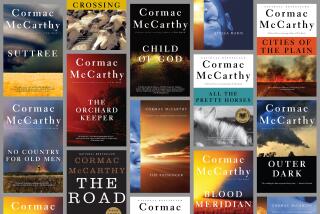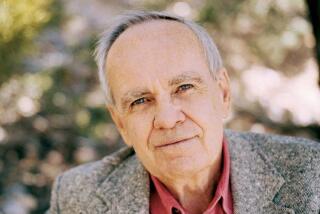R. Chapman, 81; Wordsmith, Roget’s Editor
- Share via
Most of us who have ever needed a good word have turned to an alphabetical thesaurus and quickly found a list of possibilities more impressive, more tantalizing or simply more accurate than the one our feeble vocabulary had mustered. Then we wrote the sentence or filled in the crossword and our search was over, done, finished, concluded, terminated.
Efficient? Yes. But not much fun, according to Robert L. Chapman, a lexicographer and editor who spent three decades in the word business.
Chapman, who was 81 when he died Jan. 27 in Morristown, N.J., after a long illness, once described himself as a “faithful and somewhat saucy servant of genius.” He was referring to Peter Mark Roget, who wrote the first Roget’s International Thesaurus in 1852 and whose work Chapman revised more than a century later.
Roget is famous for organizing the verbal universe by concept, listing thousands of words under headings such as Space, Matter and Intellect. Not intended as a mere synonym finder, Roget’s thesaurus was structured in a way meant to stimulate thought and chains of association that may not have occurred to the user.
Using Roget’s thesaurus requires two steps: First you flip to the voluminous index to find a word, then thumb to the referenced page. A search for an alternative to “nice,” for instance, would lead to the category “Kindness, Benevolence,” where the lengthy list of choices ranges from “goodness” and “benignity” to “Christlike,” “Robin Hood,” “Lady Bountiful,” even “flower power.”
But Roget, and Chapman, would not have wished you to stop there. Maybe you would turn to the next, even longer category, called “Unkindness, Malevolence.” Perhaps there it occurs to you that the idea you had in mind is better expressed in the negative, as in “malignant,” “ornery” and “cussed” or “corrosive,” “sadistic” and “invidious.”
Had you simply looked up “nice” in an A-Z word-finder, you might not have made the journey to “devilish.” That’s the kind of discovery that would have delighted Chapman.
Alphabetical thesauri are so “jejune,” Chapman once told the New York Times. “You take one of those [alphabetical] books and you take the head word and six or seven synonyms and that’s all you get. Whereas I would give you four or five times as many with many more nuances and possibilities.
“It’s like the difference,” he said, “between roast beef and Spam.”
Chapman took the roast beef and adapted it to modern tastes.
A medieval literature expert who was an emeritus professor at Drew University in New Jersey, Chapman edited the fourth edition of Roget’s, published in 1977. He added a few new categories--the first additions in 125 years--and made enough money to indulge his passion for sailing by buying a boat, which he christened Thesaurus.
But he later felt he had not done enough to bring Roget’s into the modern age. When he was tapped to edit the fifth edition, he resolved to leave a deeper imprint.
He consulted a philosopher and a cognitive psychologist in deciding which 325,000 words and phrases to include and in what order. His rethinking of Roget’s cosmos brought 30 new categories, such as fitness and exercise, sports, environment, substance abuse and computer science.
He cast a stern eye on Roget’s strict Aristotelian logic, which had led the London physician-turned-lexicographer to scatter words about the body among several classes. Under Roget’s system, words related to the circulatory system were found under the same heading as pipes and conduits, for example, and those about the skeleton were placed alongside joists and girders. Chapman unified the terms under one roof: The Body and the Senses.
Gender-conscious, he changed the name of the category Mankind to Humankind. Acknowledging the different ways people perceive slang, profanity and sexual language, he labeled racial epithets less judgmentally, calling them “nonformal” instead of “derogatory,” which still warned users to proceed with caution.
And he added lengthy lists, such as 104 names of environmental pollutants, 222 phobias and 160 breeds of dogs.
His nod to modern times was noticeable, too, in the 225 terms for marijuana and 209 for various manifestations of intoxication. Words such as “AIDS,” “SCUD,” “ziti,” “prequel” and “fax” also made the cut.
“It’s unlikely that Peter Mark Roget ever imagined most of the ... synonyms featured in Robert Chapman’s intriguing thesaurus,” Los Angeles Times reviewer Charles Solomon wrote.
Chapman was 72 when the fifth edition appeared in 1992, just a year younger than Roget was when he published his first thesaurus. “Chappy,” as friends called him, took note of that, once saying that he, like the 19th-century reference-book icon, was “a schematizing senior citizen” with varied interests.
“The difference I find is that he was much drier and more humorless. I write poetry,” Chapman said. “I think I’m more of a romantic.”
Roget, the son of a Protestant pastor, also had a more genteel upbringing. Chapman was the son of a typewriter mechanic. He worked in factories and as a truck driver growing up in Huntington, W.Va., and was the first generation of his family to attend college.
At the University of Michigan in the early 1940s, he took classes with poet W.H. Auden. He also joined the Young Communist League and helped unionize dormitory maids. He served in the Army Signal Corps during World War II, which delayed the award of his bachelor’s degree until 1947. He returned to Michigan for his master’s in 1948 and a doctorate in 1952, then taught English at colleges in New York and Pennsylvania.
In 1942, he married the former Sarah Zeitz, who survives him along with three sons and a brother.
Chapman knew an eminent lexicographer at Michigan but did not begin to work as one himself until 1960, when he was hired by Funk & Wagnalls as chief reference editor. His career there was brief. He was nearly done editing his first dictionary when he was asked to swear in writing that he had never belonged to the Communist Party. Although he had quit the party when the Korean War broke out, he could not sign the oath. So Funk & Wagnalls demoted him on the title page from editor to supervising editor.
“I got ‘disappeared,’” Chapman said, using a term heard in the 1950s when many writers and artists were blacklisted for their political affiliations. (A few decades later, Chapman was the one who added “McCarthyism” to Roget’s, classifying it under the heading “Misuse.”)
He found other dictionary work at Holt, Rinehart & Winston. Then, in 1966, he joined the faculty at Drew, where he taught for the next two decades.
He was an early convert to computers, which made him unusual among lexicographers, said Barbara Ann Kipfer, who was chosen by Chapman to be editor of the sixth edition of Roget’s, published last year.
“Most lexicographers are afraid of computers, afraid their work will get lost,” she said. But Chapman had a computer in his office that was linked to one at the former Bell Labs (now Lucent Technologies) in New Jersey, where he could tap a database of millions of words being collected from popular media.
“I sifted, snifted, sorted and snorted and chose about 60,000 words to commend to anyone today in search of the right word,” he said.
The partnership brought him words such as “ecosystem” and “yuppie,” “crack” and “hacker”--all of which he introduced to Roget’s. He also edited the New Dictionary of American Slang and the Thesaurus of American Slang finding new words in novels, newspapers, magazines, and by just listening to people talk.
The fifth edition of Roget’s sold more than 500,000 copies. Its success caused some colleagues to compare Chapman to the late Clarence Barnhart, the enterprising American dictionary editor of the mid-20th century who found commercial success by making definitions simpler and more readable.
Chapman could joust with the sharpest semanticists, but, like Barnhart, he was no snob about language.
“He had no qualms about putting new words in,” Kipfer said. “He just said, ‘I’m pretty sure this will stick around in the language.’ That was a difference from other lexicographers in his age group, who would really agonize over it.
“He had some intuition and went with it, and he was right,” Kipfer said. “I doubt he ever got anyone writing to him saying you really shouldn’t have put that word in.”



